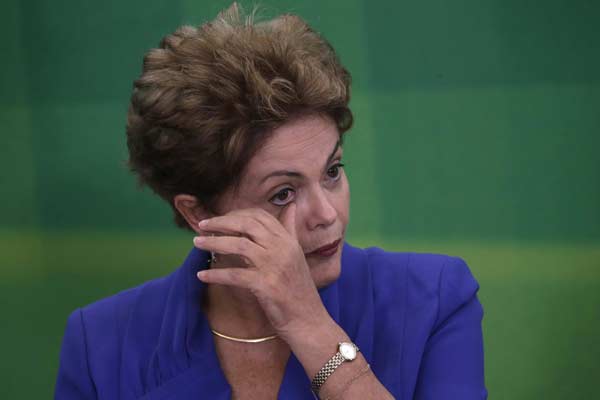Brazil's leader committed to austerity with social focus
(Agencies) Updated: 2015-03-25 13:52
 |
|
Brazil's President Dilma Rousseff reacts during a launching ceremony for the Anti-Corruption Package at the Planalto Palace in Brasilia, March 18, 2015. [Photo/Agencies] |
BRASILIA - Brazilian President Dilma Rousseff said on Tuesday her government is firmly committed to fiscal adjustment but will not sacrifice social programs to balance its overdrawn public accounts.
"The government knows that the adjustment is fundamental for Brazil, but that does not mean that social policies will not be maintained," Rousseff said.
She made the comment after extending for another four years a generous formula for calculating minimum wage increases, a move aimed at appeasing disgruntled labor unions.
Rousseff's government has adopted unpopular austerity measures to reduce Brazil's gaping fiscal deficit and save the country's coveted investment grade rating from credit agencies.
The belt-tightening steps, which include tax increases and stricter rules for access to unemployment and pension benefits, have run into opposition from Rousseff's coalition allies in Congress and even her own Workers' Party.
The renewal of the minimum wage formula would have a fiscal impact of 20.1 billion reais ($6.40 billion) in 2016, 33.8 billion reais in 2017 and 41.1 billion reais in 2018, according to estimates provided by the planning ministry. The minimum wage is linked to several social programs and pensions.
Rousseff implemented the extension through an executive order. The formula calculates annual increases in the minimum wage using the prior-year inflation plus the level of GDP growth from two years back, if positive.
Standard and Poor's on Monday maintained a stable outlook for Brazil's investment-grade debt rating, a vote of confidence in Rousseff's efforts to clean up the country's finances.
However, the rating agency, which last year cut Brazil's rating to one notch above junk, said it could lower the outlook if Rousseff steps away from measures to shrink the deficit. ($1 = 3.1385 Brazilian reais)






